Imagine a world where organizations have the power to build, scale, and transform their applications with ease. A world where data becomes a valuable asset, unlocking insights and propelling innovation. Welcome to the realm of Google Cloud Platform (GCP) – a dynamic and imaginative universe that empowers businesses to redefine the possibilities of the digital era.
At the heart of GCP lies a robust and flexible infrastructure that serves as the launchpad for organizations to soar to new heights. Whether you’re a startup, a mid-sized company, or a global enterprise, GCP offers a galaxy of services tailored to meet your unique needs. From computing and storage to databases, networking, and machine learning, the celestial array of services in GCP can be woven together to create a tapestry of possibilities.
Cloud computing has revolutionized the way businesses leverage technology, providing powerful and flexible infrastructure solutions. Among the leading Infrastructure-as-a-Service (IaaS) providers, Google Cloud Platform (GCP) stands out with its Compute Engine offering. In this blog, we will delve into the capabilities and advantages of GCP Compute Engine, exploring how it empowers businesses to harness scalable computing power for a wide range of workloads.
Benefits of Using GCP:
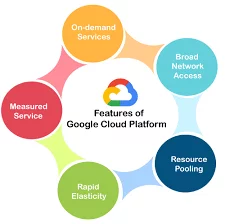
- Scalable Computing Power: GCP Compute Engine offers businesses the ability to scale their computing power based on their specific requirements. With its flexible instance types, businesses can select virtual machines (VMs) tailored to their workloads, whether it’s CPU-intensive tasks, memory-intensive applications, or high-performance computing (HPC). Compute Engine’s autoscaling feature dynamically adjusts resources to match demand, ensuring optimal performance and cost-efficiency.
- High-Performance Infrastructure: Google’s global infrastructure powers the Compute Engine, enabling businesses to access high-performance computing resources. Compute Engine takes advantage of Google’s vast network of data centers, interconnected with high-speed fiber-optic links, to deliver low-latency and high-bandwidth connectivity. This infrastructure ensures businesses can handle demanding workloads, deliver responsive applications, and support data-intensive tasks.
- Reliable and Secure Environment: GCP Compute Engine prioritizes reliability and security, offering businesses peace of mind. It leverages Google’s robust data centers, redundant hardware, and fault-tolerant systems, minimizing downtime and ensuring business continuity. Google’s security measures, including encryption at rest and in transit, identity and access management, and built-in DDoS protection, safeguard businesses’ data and applications from threats.
- Customizability and Integration: Compute Engine provides businesses with the flexibility to customize their virtual machines, allowing them to configure instances with specific resources, operating systems, and software. This level of customization enables seamless integration with existing infrastructure and applications, facilitating migration to the cloud. Compute Engine also integrates with other GCP services, such as Cloud Storage, BigQuery, and Kubernetes Engine, enabling businesses to build comprehensive cloud solutions.
- Cost-Effective Pricing: GCP Compute Engine offers competitive pricing options, allowing businesses to optimize their costs based on their usage patterns. It provides various pricing models, including on-demand, preemptible, and committed use discounts, giving businesses flexibility and cost savings. Additionally, Compute Engine’s sustained use discounts incentivize long-running workloads, further reducing costs for consistent utilization.
- Elasticity and Agility: With GCP Compute Engine, businesses can rapidly provision and scale resources, enabling them to respond to changing demands efficiently. The ability to create instances in minutes and scale up or down as needed empowers businesses to adjust their infrastructure to match workload fluctuations. This elasticity and agility ensure businesses can quickly innovate, experiment, and launch new applications or services.
Services Offered by GCP:
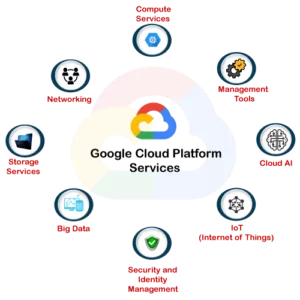
1. GCP Compute Engine:
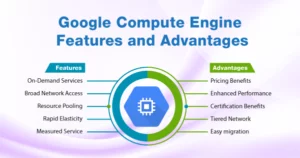
With Compute Engine, businesses can easily deploy and manage virtual machines tailored to their specific needs. Whether it’s a small project or a resource-hungry application, Compute Engine offers a variety of instance types to choose from. You can select the right instance type to match your computing requirements, ensuring optimal performance and cost-effectiveness.
One of the standout features of Compute Engine is its autoscaling capabilities. This means that as your workload fluctuates, Compute Engine automatically adjusts the number of virtual machines to meet the demand. When the workload increases, additional VMs are added to handle the increased traffic. And when the demand subsides, the extra VMs are automatically scaled down, saving costs and optimizing efficiency. It also boasts high-performance networking, ensuring that your data travels at lightning-fast speeds within the cloud. This means faster communication between virtual machines and quicker data transfers. With robust and reliable networking, your applications can deliver a seamless user experience and handle data-intensive tasks efficiently.
Additionally, Compute Engine offers a customizable infrastructure that can be tailored to your specific requirements. You have the freedom to choose the operating system, storage options, and networking settings that best suit your needs. This flexibility allows you to create a computing environment that aligns perfectly with your business objectives.
Security is a top priority in the Compute Engine universe. Google Cloud’s advanced security measures protect your data, both at rest and in transit. With encryption, identity and access management, and constant monitoring, you can have peace of mind knowing that your valuable information is safeguarded against potential threats.
2. GCP App Engine:
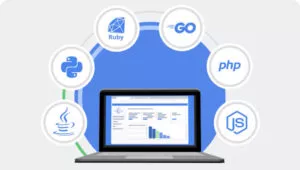
Whether you’re a startup looking to launch your first web application or an enterprise with complex API requirements, Google Cloud Platform’s App Engine is the perfect solution for you. With its powerful features and intuitive interface, App Engine offers a scalable, reliable, and cost-effective platform for building and deploying your applications, allowing you to focus on what you do best—creating amazing experiences for your users.
Developers will appreciate tits flexibilty. It supports popular programming languages such as Python, Java, Node.js, and Go, providing developers with the freedom to choose the language they are most comfortable with. App Engine also offers a wide range of development tools, SDKs, and frameworks, making it easy to build and deploy applications quickly.
With built-in services and APIs, App Engine simplifies common tasks and accelerates development. Whether it’s user authentication, database management, or sending emails, you can leverage the pre-built services to streamline your development process. These services are seamlessly integrated into the platform, saving you time and effort in implementing these functionalities from scratch.
3. GCP Kubernetes Engine:
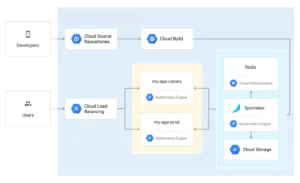
Kubernetes is an open-source container orchestration platform that automates the deployment, scaling, and management of containerized applications. With GKE, you can easily create, deploy, and manage your Kubernetes clusters in the cloud. It offers advanced networking capabilities. It provides high-performance, low-latency networking for your containers, enabling fast and efficient communication between services. GKE also supports network policies, allowing you to define fine-grained access controls and secure communication between your application components.
GKE integrates seamlessly with other Google Cloud services. You can easily leverage services like Cloud Storage, BigQuery, Pub/Sub, and many others within your Kubernetes applications. This integration enables you to build powerful and scalable solutions that leverage the full range of Google Cloud’s capabilities.
4. GCP Cloud Functions:
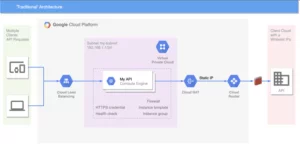
Google Cloud Functions is a serverless compute platform provided by Google Cloud that allows developers to write and deploy small, single-purpose functions. These functions are designed to respond to events without the need to manage any underlying infrastructure. With Google Cloud Functions, developers can focus on writing code and implementing business logic without worrying about server provisioning, scaling, or maintenance.
One of the key features of Google Cloud Functions is its ability to provide a serverless environment for executing code in response to triggers from various Google Cloud Platform (GCP) services or custom events. This means that developers can define functions and specify the events that should trigger their execution. Some examples of triggers include changes in data in Cloud Storage, incoming messages in Cloud Pub/Sub, HTTP requests to specific endpoints, and updates in Firestore databases.
When an event that matches the defined trigger occurs, Google Cloud Functions automatically scales the necessary compute resources and executes the corresponding function. This automatic scaling ensures that functions are only running when needed, resulting in cost-efficient resource utilization. Additionally, Google Cloud Functions provides high availability and fault tolerance by replicating function instances across different data centers.
5. GCP Cloud Storage:
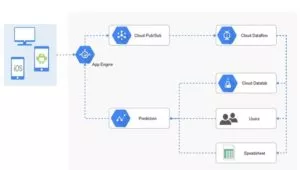
Google Cloud Storage offers different storage classes, each with its own set of performance and cost characteristics. These storage classes provide flexibility in managing data based on its access patterns and durability requirements. The available storage classes include:
- Standard: This is the default storage class and is suitable for frequently accessed data. It offers high performance, low latency, and high availability.
- Nearline: This storage class is ideal for data that is accessed less frequently but requires fast access when needed. Nearline storage offers slightly higher latency but provides significant cost savings compared to the Standard class.
- Coldline: Coldline storage is designed for long-term archiving and backup purposes. It offers the lowest storage cost among the storage classes but with higher access latency. Coldline storage is suitable for data that is rarely accessed.
- Archive: Archive storage provides the lowest cost option for long-term data retention. It is optimized for data that is rarely accessed and has extended access latency. Retrieving data from the Archive storage class may take several hours.
6. GCP BigQuery:
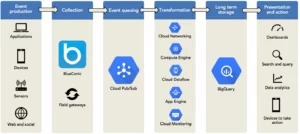
Google BigQuery is a fully managed, serverless data warehouse that enables businesses to analyze large datasets quickly. With its support for SQL queries, high scalability, real-time analytics capabilities, and integration with other GCP services, BigQuery provides a powerful platform for data analysis and insights generation. Its security features, data management options, and flexible pricing models make it an attractive choice for organizations seeking to unlock the value of their data.
Data security and governance are top priorities for it. It offers multiple layers of data protection, including encryption at rest and in transit. Data in BigQuery is encrypted by default, and users can also bring their encryption keys for added control over data security. BigQuery integrates with Google Cloud Identity and Access Management (IAM) for fine-grained access control, ensuring that only authorized users can access and manipulate data.
7. GCP Cloud Pub/Sub:
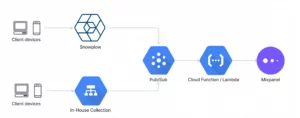
Google Cloud Pub/Sub is a messaging service provided by Google Cloud that enables the streaming and delivery of real-time data and events. It is designed to provide reliable and scalable messaging capabilities for building event-driven architectures and facilitating communication between components of distributed systems.
At its core, it follows a publish-subscribe model. Publishers send messages to specific topics, and subscribers receive those messages from the topics they are interested in. This decoupled architecture allows for flexible and scalable communication between various components of an application or system. It provides ordering guarantees for messages within a topic partition. Messages with the same ordering key are delivered to subscribers in the order they were published. This feature is particularly useful when maintaining message order is critical, such as processing events sequentially or ensuring correct data synchronization.
To enhance security, Google Cloud Pub/Sub offers encryption for data at rest and in transit. It encrypts messages using Google-managed encryption keys by default, and users can also bring their own encryption keys for added control. Pub/Sub integrates with Google Cloud Identity and Access Management (IAM), enabling fine-grained access control to topics and subscriptions.
8. GCP IAM:
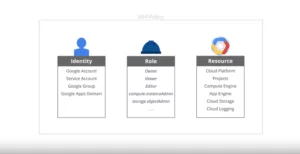
Google Cloud Identity and Access Management (IAM) is a comprehensive access management service provided by Google Cloud. It allows businesses to manage access to their cloud resources and services in a secure and controlled manner. Google Cloud IAM provides fine-grained access control, enabling businesses to grant permissions to specific users or groups and implement security policies to protect their resources. It integrates seamlessly with various Google Cloud services, allowing businesses to manage access control across different services from a centralized location.
This integration ensures consistent and unified access management across the entire Google Cloud Platform (GCP) ecosystem. Businesses can apply IAM policies to resources such as virtual machines, storage buckets, databases, and other services, thereby enforcing consistent access controls and security policies. It provides a hierarchical structure for managing access control called the resource hierarchy. This hierarchy consists of organizations, folders, projects, and resources. Access control policies can be applied at each level of the hierarchy, enabling businesses to implement access controls at different levels of granularity. This hierarchical approach simplifies access management for organizations with complex structures and helps enforce consistent policies across the entire organization.
9. Cloud Monitoring and Logging:
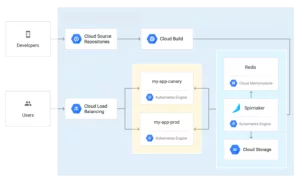
Google Cloud Platform (GCP) provides a comprehensive suite of monitoring and logging services that enable businesses to gain valuable insights into the performance, availability, and health of their applications and infrastructure. These services help businesses proactively monitor, troubleshoot, and set up alerting based on customizable metrics and logs.
One of the key monitoring services offered by GCP is Google Cloud Monitoring. It provides a centralized platform for collecting, analyzing, and visualizing metrics from various cloud resources and services. With Cloud Monitoring, businesses can monitor the health and performance of their applications, virtual machines, databases, and other resources in real-time. It offers a wide range of built-in metrics that cover various aspects of GCP services. These metrics provide insights into CPU usage, network traffic, latency, disk I/O, and other important performance indicators. Additionally, businesses can also create custom metrics to monitor specific aspects of their applications or infrastructure that are not covered by the built-in metrics.
10. AI and Machine Learning:
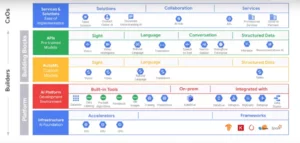
GCP provides a suite of AI and machine learning services, including AutoML, AI Platform, and TensorFlow that enable businesses to build, train, and deploy machine learning models at scale. Whether through AutoML for simplified model development, AI Platform for scalable training and serving, or TensorFlow for powerful open-source framework support, GCP offers a range of tools and capabilities to empower businesses in leveraging AI technology. By incorporating AI and machine learning services into their workflows, organizations can extract insights from data, develop intelligent applications, and make data-driven decisions to drive innovation and growth.
Pros of GCP:
- Scalability and Flexibility: GCP offers a highly scalable infrastructure that allows businesses to easily scale their resources up or down based on demand. This flexibility enables businesses to efficiently handle varying workloads. With services like Compute Engine, businesses can dynamically adjust their computing resources as needed.
- Global Infrastructure and High Performance: GCP has a vast network of data centers located around the world, interconnected by high-speed fiber-optic links. This global infrastructure provides businesses with low-latency and high-bandwidth connectivity, ensuring excellent performance for their applications. You can learn more about GCP’s global infrastructure here.
- Extensive Service Offerings: GCP provides a wide range of cloud services and products, including compute, storage, networking, databases, machine learning, analytics, and more. This extensive portfolio allows businesses to build comprehensive and customized solutions to meet their specific requirements. Explore GCP’s services and products here.
- Strong Security Measures: GCP prioritizes the security of customer data and applications. It offers robust security features such as encryption at rest and in transit, identity and access management, DDoS protection, and compliance with various industry standards and regulations. Learn more about GCP’s security features here.
- Cost-Effective Pricing: GCP offers flexible pricing models, allowing businesses to optimize their costs based on their usage patterns. It provides options such as pay-as-you-go, sustained use discounts, and committed use contracts, enabling businesses to control and manage their cloud expenses effectively. You can explore GCP’s pricing details here.
Cons of GCP:
- Learning Curve for Beginners: GCP, like other cloud platforms, has a learning curve, especially for users who are new to cloud computing. Understanding and navigating the various services and tools may require time and effort to become proficient. However, GCP provides extensive documentation, tutorials, and learning resources to help users get started.
- Complex Pricing Structure: GCP’s pricing structure can be complex, with multiple factors influencing the overall costs, such as instance types, storage options, network egress, and data transfer fees. Businesses need to carefully plan and monitor their resource usage to optimize costs effectively. You can use the GCP Pricing Calculator to estimate costs for various services.
- Limited Documentation for Some Services: While GCP has extensive documentation for most of its services, there may be instances where documentation or examples for specific use cases or niche services are relatively limited, requiring additional research or support. However, GCP continuously improves its documentation and provides support channels to assist users.
- Less Market Share Compared to Competitors: GCP has a slightly smaller market share compared to some of its competitors, such as Amazon Web Services (AWS) and Microsoft Azure. This can result in a slightly smaller ecosystem of tools, libraries, and community support compared to the more dominant cloud platforms. However, GCP has a growing user base and an active community of developers and experts.
Conclusion:
Google Cloud Platform’s Compute Engine stands as a leading Infrastructure-as-a-Service offering, providing businesses with powerful and flexible computing infrastructure. With its scalable computing power, high-performance infrastructure, reliability, security, customizability, cost-effectiveness, and agility, Compute Engine empowers businesses to tackle diverse workloads with ease. By harnessing the capabilities of GCP Compute Engine, businesses can unlock the full potential of cloud computing, driving innovation and growth in today’s competitive landscape.
Learn about GCP best practices here.
FAQs on GCP:
What support options are available for GCP users?
GCP offers different support plans, including Basic, Silver, Gold, and Platinum, with varying levels of access to support resources, response times, and technical assistance. Users can also access the GCP documentation, community forums, and official support channels for troubleshooting and guidance.
Can I use GCP for hosting websites and web applications?
Yes, GCP provides services like Compute Engine, App Engine, and Cloud Storage that can be used to host websites and web applications. GCP’s infrastructure offers scalability, high performance, and global reach for serving web content.
Does GCP provide data analytics and big data processing capabilities?
Yes, GCP offers various services for data analytics and big data processing, such as BigQuery for querying large datasets, Dataflow for stream and batch data processing, and Pub/Sub for real-time messaging. GCP also integrates with popular data analytics tools like Apache Spark and Apache Hadoop.
Can I migrate my existing applications to GCP?
Yes, GCP provides tools and services to facilitate the migration of applications from on-premises or other cloud platforms to GCP. Tools like Cloud Migration Service, Database Migration Service, and Transfer Appliance can help simplify and streamline the migration process.
How does GCP differ from other cloud platforms like AWS and Azure?
GCP, AWS, and Azure are all major cloud service providers, but they have differences in terms of service offerings, pricing models, and ecosystem. GCP is known for its strong integration with other Google services, machine learning capabilities, and emphasis on data analytics. It also offers a global infrastructure with high-performance networking. Comparing the three platforms can help determine which one best suits specific business needs.
How secure is GCP?
GCP prioritizes security and offers robust security features such as encryption at rest and in transit, identity and access management, DDoS protection, and compliance with various industry standards and regulations. GCP undergoes regular audits and assessments to ensure data protection. However, businesses are responsible for implementing proper security practices and configurations to secure their applications and data.



